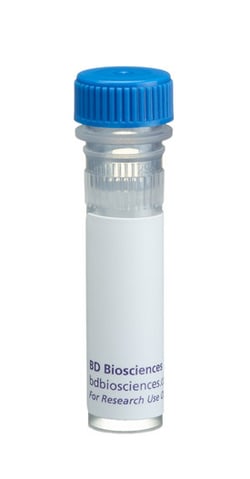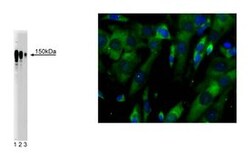Learn More
Ataxin-2 Mouse, Unlabeled, Clone: 22, BD
Mouse Monoclonal Antibody
Supplier: BD Biosciences 611378
Description
The hereditary ataxias are neurodegenerative disorders characterized by abnormalities of balance due to dysfunction of the cerebellum and cerebellar pathways. Spinocerebellar ataxias (SCAs) represent a heterogeneous group of disorders with a prevalence of about 1 in 10^5. Moderate expansion (36 or 37 units) of CAG repeats on the SCA2 gene leads to a gene product, ataxin-2, that has a long polyglutamine tract. Ataxin-2 is a basic protein with two domains (Sm1 and Sm2) that have been implicated in RNA splicing and protein interaction. Human ataxin-2 has significant homology with mouse ataxin-2 and ataxin-2 related protein. Ataxin-2 is expressed as early as day 8 of mouse embryogenesis and is detected in brain, heart, placenta, liver, skeletal muscle, and pancreas, but not in lung or kidney. Expression increases with age and the protein is localized to the cytoplasm in purkinje cells and other neuronal cell types. Thus, ataxin-2 is thought to be important for RNA splicing or protein complex formation in many normal tissues, while polyglutamine containing ataxin-2 leads to neuropathology.

Specifications
| Ataxin-2 | |
| Monoclonal | |
| 250μg/mL | |
| Aqueous buffered solution containing BSA, glycerol, and ≤0.09% sodium azide. | |
| Human Ataxin-2 aa. 713-904 | |
| 50 μg | |
| Cell Biology | |
| Human, Rat | |
| IgG1 |
| Western Blot | |
| 22 | |
| Unconjugated | |
| Mouse | |
| Affinity Purified | |
| RUO | |
| Primary | |
| Store undiluted at -20°C. |
Your input is important to us. Please complete this form to provide feedback related to the content on this product.

